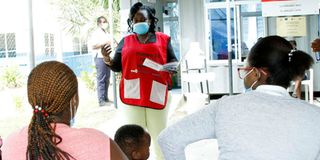We must innovate to find the 40pc missing people with TB

Community health advocate Anne Nyambura, a tuberculosis champion, at Tudor Sub-County Hospital, last August 16, 2021.
What you need to know:
- Most people with TB do not seek care, for the assumption that their symptoms are not severe enough.
- Covid-19 has reversed years of progress in providing essential TB services and reducing this curable disease.
Due to poor health seeking behaviour, one of the major causes of ill health and death globally is tuberculosis (TB). The disease, which is traced to 9,000 years ago in Atlit Yam — a city now under the Mediterranean Sea, off the coast of Israel — was the leading killer from a single infectious agent before Covid-19.
Most people with TB do not seek care, for the assumption that their symptoms are not severe enough to require medical attention.
The Covid-19 pandemic has reversed years of progress in providing essential TB services and reducing this preventable and curable disease that kills more than 4,100 people daily with close to 30,000 infected.
The WHO puts the number of newly diagnosed TB cases and those reported to national governments at 5.8 million in 2020. Some 4.1 million people suffer from TB but have not been diagnosed with the disease or reported it.
Kenya is classified as a high burden country for TB and TB/HIV (“WHO Global TB Report 2021”). TB is the fourth-leading cause of death in the country. The 2016 National TB Prevalence Survey found that about half of the people with TB are missed by public health services. Yet research shows an infected person who is not on treatment can infect 10 to 15 people in close contact within a year, posing a big challenge in TB control.
Annual World TB Day
Despite a strategy of linking the community to the health system in the country, a number of gaps limit the effectiveness of TB case finding interventions at the community level.
Today is the annual World TB Day. The theme for the event is “Invest to end the epidemic”. Investing in innovations to find missing TB cases is critical in ending this epidemic. Through Global Fund support, Kenya redesigned its TB control strategies to incorporate innovations from civil society organisations in order to find undiagnosed TB cases.
The innovations are implemented under the Kenya Innovation Challenge TB Fund (KIC-TB), through Amref Health Africa in Kenya and its partners and the Ministry of Health. That has achieved great success in the reduction of TB prevalence in Kenya.
KIC-TB has provided an excellent opportunity for organisations and groups working with communities to show how innovative and impactful they can be in the national fight against TB. Emphasis is on finding missing TB cases . The objective is to find missing TB cases using innovative strategies unique to the local settings, accelerate case finding and scale up proven tools and approaches.
Fight against TB
Eleven innovations have been implemented since 2019. One involves children leading the fight against TB through screening themselves and their families. Thus, children will carry TB knowledge into their adult life and households, transforming the entire community. Another engages inmates in prison, staff and their families to screen for TB.
Others include finding missing people with TB among mobile populations, self-screening for TB using an automated TB screening machine (ATSM) — which is similar to the Automated Teller Machine (ATM) — stationed at high traffic areas like Huduma Centres, railway terminuses and passport control centres in Nairobi; and TB screening in the matatu industry targeting men in the public transport sector (drivers, conductors and touts).
These innovations are key in finding missing people with TB. But they have gaps that must be identified early and appropriate strategies put in place to address them. We should encourage innovative ideas in our public health programming, particularly for the key populations and the underserved.
These ideas should be mainstreamed in routine programming with clear national level indicators to ensure that they are resourced.
Civil society must not tire in their role to undertake evidence-informed advocacy to ensure that policy-makers proactively dedicate and allocate resources, domestic and from donors, to end TB. With strategic innovations, solidarity, determination and equitable use of resources, we will end TB.
Let us embrace innovations.
Mr Ulo is the Global Fund TB Grant Programme manager at Amref Health Africa. [email protected]





